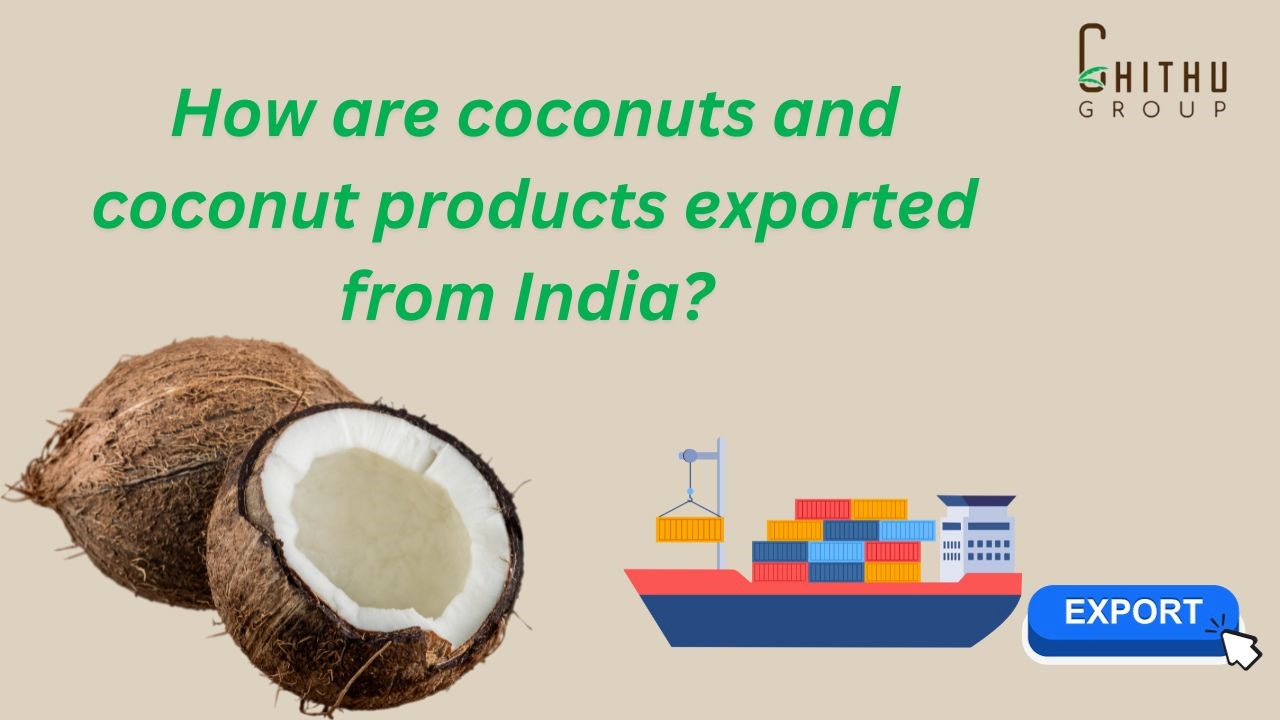



India's total export in June 2023 is expected to be around US$ 60.09 billion.
In this article, let us look into a range of coconut products exported, top destination markets, the significance of certifications, the role of quality control, and the challenges and opportunities that shape this export industry.
Whether you are a consumer interested in the journey of your favorite coconut-based products or a business professional seeking insights into this sector's intricacies, this exploration will provide valuable perspectives on coconut exporters in India.
Here are some key points regarding coconut and coconut product exports from India.
Raw coconut is the term used to describe a mature coconut without any processing or refinement. It is sourced directly from the coconut palm trees and is valued for its natural state, texture, and unique composition.
India offers a wide range of coconut-based exports, catering to various industries. Fresh coconuts are exported for consumption, and their water is bottled or canned for coconut water products.
Desiccated coconut is popular in the baking and confectionery industry, while coconut oil is used in cooking, cosmetics, and pharmaceuticals.
Coconut milk and cream are essential ingredients in Asian and global cuisines, while coconut-based snacks and chips have gained popularity as healthy snacks.
Middle Eastern countries like Saudi Arabia, UAE, and Qatar are significant importers of Indian coconuts and coconut products.
European countries, including London, Germany, and the Netherlands, have a growing demand for coconut-based items.
The United States is a substantial market for Indian coconut products, driven by the popularity of coconut oil in health-conscious circles.
Neighboring Asian countries like Sri Lanka and Bangladesh also import coconut products from India due to proximity.
India has regulations governing the export of coconut products. Exporters need to comply with quality standards and obtain necessary certifications to ensure the products meet international requirements.
Regulations include quality standards, packaging requirements, and documentation for customs clearance.
Certifications like the Food Safety and Standards Authority of India (FSSAI) license and organic certifications are often necessary to meet international standards.
India has numerous coconut processing facilities that convert raw coconuts into value-added products such as coconut oil and desiccated coconut.
These processing units play a crucial role in meeting export demands. Say for example the process for coconut coir is way long different and is used for different purposes.
Related article How Coconut Coir is Used for Plants?
The demand for coconut-based products has been growing globally due to their health benefits and versatility. Coconut oil, in particular, has gained popularity as a cooking oil and a key ingredient in cosmetics and personal care products.
Coconut-based products have gained popularity due to their health benefits, including the presence of medium-chain triglycerides (MCTs) in coconut oil.
The versatility of coconut makes it a valuable ingredient in the food and beverage industry, especially in plant-based and dairy-free products.
Some challenges that the coconut industry in India faces include fluctuations in coconut production due to weather conditions, price fluctuations in the global market, and competition from other coconut-producing countries like Indonesia, the Philippines, and Sri Lanka.
Maintaining consistent quality and adhering to international food safety standards can be challenging for small-scale producers.
The Indian government has initiated programs to promote coconut cultivation, enhance productivity, and support the coconut industry. These initiatives aim to make India's coconut exports more competitive on the global market.
Quality control starts at the farm level, where farmers must follow best practices in coconut cultivation.
This includes proper irrigation, disease management, and harvesting techniques to ensure that coconuts are of the highest quality.
After harvesting, coconuts must be handled carefully to prevent damage and contamination. Hygiene and cleanliness are critical during this stage.
Maintaining high-quality standards is crucial for the export of coconut products. Indian authorities and export agencies work to ensure that exported products meet international quality and safety standards.
Proper packaging and labeling are crucial to prevent contamination and protect product quality. Packaging materials should be suitable for the intended product and ensure that the product remains fresh during transportation and storage.
Maintaining accurate records and traceability of coconut products is essential for quality control. Traceability helps identify the source of any quality issues and facilitates recalls if necessary.
Organic coconut products are in high demand among health-conscious consumers, as they are perceived as being more natural and environmentally friendly.To obtain organic certification, coconut producers must adhere to strict organic farming practices and undergo regular inspections by certifying agencies.
Exporters often seek certifications such as organic, fair trade, and food safety certifications to access premium markets and meet the demands of health-conscious consumers.
These certifications guarantee that products are free from contaminants, pathogens, and any harmful substances that could compromise consumer health. Compliance with these standards is essential for exporting coconut products, especially to stringent markets like the European Union and the United States.
Looking for the best coconut exporter in India ?
Chithu group is the right option. We have a skilled and committed team at both our locations that cater to the needs of our customers in a timely manner.
The team in Pollachi handles shipping, documentation, and customer service, while the team in Pollachi is also responsible for production, sourcing raw materials, and ensuring quality control (Q.C).
We are proud to fulfill the needs and demands of our customers. Our efficient procedures ensure the timely and unhindered delivery of top-notch products to our global customer base.